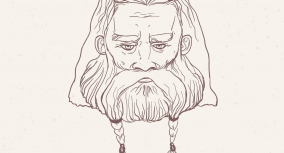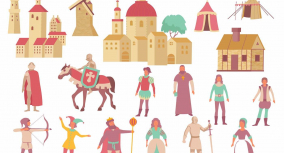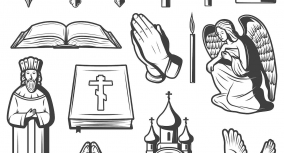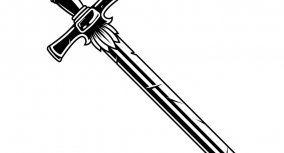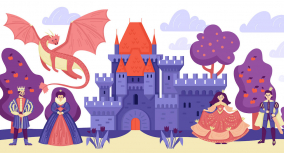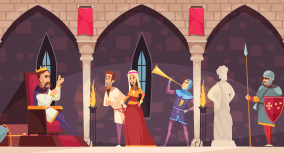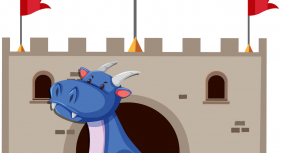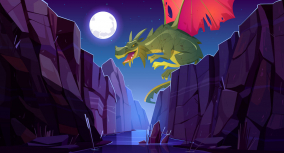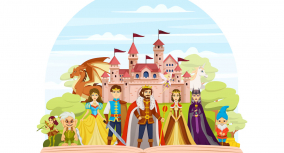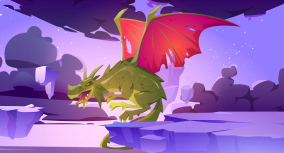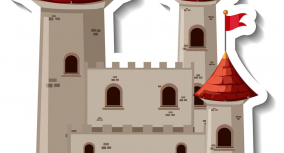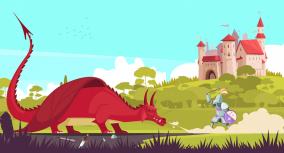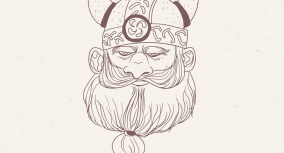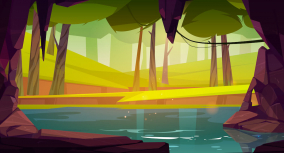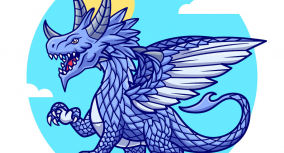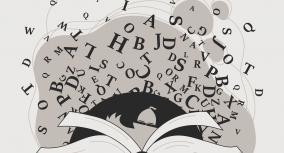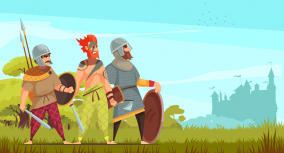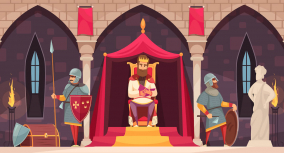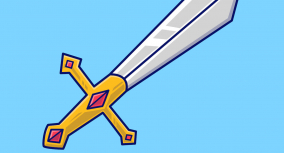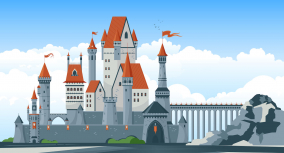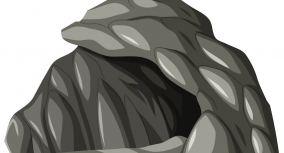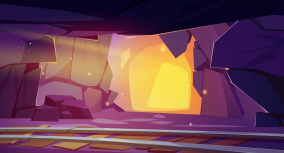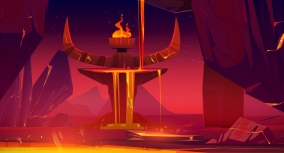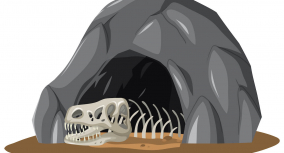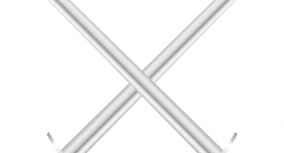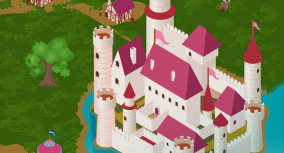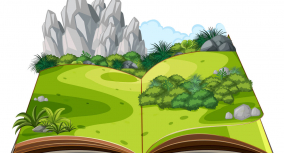This Beowulf summary offers a clear look at the key moments and figures of this iconic Old English poem.
The plot of Beowulf describes the heroic deeds of a Geatish warrior, Beowulf, who comes to help King Hrothgar and the Danes, terrorized by a horrible monster, Grendel. After the brutal battle with Grendel (read full summary below), Beowulf must confront Grendel’s vengeful mother in an underwater lair. Victorious once again, he returns home and eventually becomes the respected king. Later in life, Beowulf faces a dragon attacking his land. He destroys the creature but is wounded in the fight and dies.
Looking for a Beowulf synopsis or a detailed chapter-by-chapter breakdown? In this article, prepared by Custom-Writing.org experts, you’ll find everything you need: a short summary of Beowulf, a visual plot diagram with a timeline, and comprehensive chapter summaries to enhance your grasp of the Beowulf plot.
✍️ Beowulf Short Summary
In the 6th century AD, King Hrothgar built a mead-hall. During a celebration, a monster named Grendel broke in and murdered many people. Beowulf, a prominent hero, helps the King of Danes to get rid of the beast. When Grendel is dead, his mother also attacks the hall. Beowulf kills her too.
📊 Beowulf Plot Diagram
Below, you will find the plot of Beowulf in a convenient visual form:
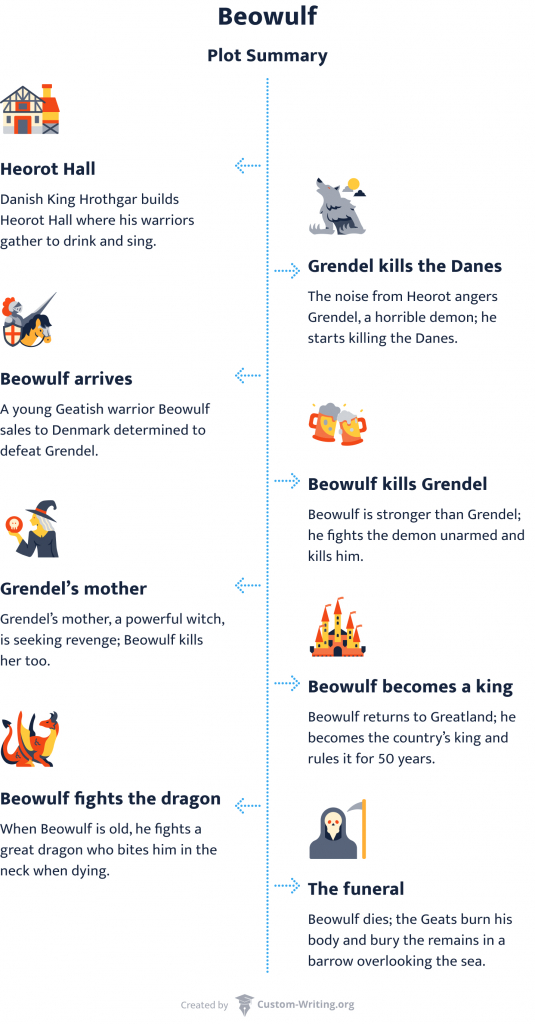
📖 Beowulf Chapter Summaries
Below you’ll find a detailed summary of Beowulf. The quotes were taken from the translation made by John Lesslie Hall, an American poet and literary scholar, that was published in 1892.
The Story Begins (Beowulf, Part 1 – 7)
Beowulf’s introduction and part 1 tell that Denmark was once ruled by a king from the glorious Scyld dynasty. His name was Hrothgar. He was lucky in wars with neighbors and accumulated great wealth. Hrothgar decided to perpetuate his honor forever. For this purpose, he built a magnificent mead-hall Heorot.
The king spared no effort or money for the construction, and the most skilled craftsmen built the hall. As soon as the decoration was complete, Hrothgar started to feast with his warriors. By part 2 of Beowulf, the clinking of cups and the songs of royal singers were heard far away.
In due time it happened
Beowulf, Narrator, Part II, Lines 23-26
Early ’mong men, that ’twas finished entirely,
The greatest of hall-buildings; Heorot he named it
Who wide-reaching word-sway wielded ’mong earlmen.
The noise of King Hrothgar’s feasts reached the Grendel’s lair. This monstrous creature lived nearby in the fetid swamps. Grendel hated people, and their fun infuriated him.
In chapter 3, the monster crept silently to Heorot Hall. After the long feast, the careless warriors were sleeping. Grendel grabbed thirty knights and dragged them to his lair to eat them.
The monster of evil
Beowulf, Narrator, Part III, Lines 6-11
Greedy and cruel tarried but little,
Fell and frantic, and forced from their slumbers
Thirty of thanemen; thence he departed
Leaping and laughing, his lair to return to,
With surfeit of slaughter sallying homeward.
In the morning, screams of horror replaced the clicks of cups. No one knew where the knights had disappeared. But after much distress and guesswork, carelessness prevailed over fears. Hrothgar and his knights resumed their feast. Grendel stole several knights every night.
People had to abandon Heorot every night for the monster. This state of things lasted for twelve winters. Hrothgar prayed in vain to the gods to help him get rid of the misfortune. But Grendel kept on coming there at night in search of prey.
The rumor of this disaster reached the land of the Geats (southern Sweden), where the glorious King Hygelac ruled. His best knight and nephew, Beowulf, wanted to help King Hrothgar.
He bade them prepare him a bark that was trusty;
Beowulf, Narrator, Part IV, Lines 10-12
He said he the war-king would seek o’er the ocean,
The folk-leader noble, since he needed retainers.
Despite all the attempts to dissuade him, Beowulf chose fourteen brave warriors and sailed to Denmark. Encouraged by the happy omens, he moored.
A coast guard met them and hurried to report to Hrothgar. Hrothgar’s herald Wulfgar questioned the strangers. The leader called himself Beowulf. Hrothgar knew this glorious name and that he was equal in strength to thirty mighty knights, as the reader will learn in part 7 of Beowulf. Wulfgar delivers the royal greeting and an invitation to a feast to the visitors.
Beowulf claimed he was going to fight the monster with bare hands because Grendel used no weapons. “Fate will go as it must,” he concluded.
The foe I must grapple, fight for my life then,
Beowulf, Beowulf, Part VII, Lines 67-69
Foeman with foeman; he fain must rely on
The doom of the Lord whom death layeth hold of.
Beowulf vs. Grendel (Beowulf, Part 8 – 13)
Seeing the honor with which Hrothgar accepted the strangers, many Danes envy them. Unfert even recalls the reckless swimming competition between Beowulf and a Geat named Breca. Back then, Breca won, so Unfert questioned if Beowulf could defeat the beast.
The hero explained that they swam in armor for five nights, and he was leading. Then the tide separated them, and a monster pulled Beowulf to the bottom of the ocean. He killed it, but “time and time again, the foul things attacked.” He survived the battle with nine beasts but came second. In turn, wanting to test Unfert’s courage, Beowulf invited him to stay the night in the hall and keep the defense from Grendel. Unfert fell silent, so fun reigned in the hall again.
There was laughter of heroes; loud was the clatter,
Beowulf, Narrator, Part X, Lines 54-55
The words were winsome.
Then King Hrothgar reminded everyone that the guests would have a night battle. Everyone got up, saying goodbye to the brave knights. Parting, Hrothgar promised Beowulf that, if he relieved the Danes from grave trouble, he could demand whatever he wanted.
Beowulf ordered the doors to be locked with strong bolts. Preparing for sleep, he took off his armor and remained completely unarmed. “When it comes to fighting, I count myself as dangerous any day as Grendel,” Beowulf claimed. He knew that in the battle, no weapon would help.
I hold me no meaner in matters of prowess,
Beowulf, Beowulf, Part XI, Lines 16-19
In warlike achievements, than Grendel does himself;
Hence I seek not with sword-edge to sooth him to slumber,
Of life to bereave him, though well I am able.
Exactly at midnight, the monstrous Grendel sneaked into the hall. He knocked out the heavy bolts and greedily ate a sleeping Geat, Hondscio.
…He quickly laid hold of
Beowulf, Narrator, Part XII, Lines 31-35
A soldier asleep, suddenly tore him,
Bit his bone-prison, the blood drank in currents,
Swallowed in mouthfuls: he soon had the dead man’s
Feet and hands, too, eaten entirely.
When Grendel was already ready to devour another warrior, a mighty hand grabbed his paw so that bones was heard cracking. Grendel wanted to run away, but holding the monster’s hand, Beowulf rushed at him. His men took up their swords to help. They did not know that no sword could harm Grendel.
Finally, the cartilage and veins in the monster’s shoulder broke. The paw remained in Beowulf’s hand. Mortally wounded, Grendel escaped the hall and ran, bleeding, into his swamps.
Grendel from thenceward
Beowulf, Narrator, Part XIII, Lines 27-32
Must flee and hide him in the fen-cliffs and marshes,
Sick unto death, his dwelling must look for
Unwinsome and woful; he wist the more fully
The end of his earthly existence was nearing,
His life-days’ limits.
Celebration in Heorot (Beowulf, Part 14 – 19)
In the morning, the joy of the people knew limits. Grendel was dead, so Heorot restored its status as the symbol of Danish unity.
All the warriors led by Unfert were respectfully silent while Beowulf talked about the night battle. All the tables were upside down, the walls were splattered with the monster’s blood, and its terrible paw was lying on the floor. The limb could not be wounded with any blade, and its fingers finished with steel-like claws.
Hrothgar’s scop composed a poem to commemorate this battle. He compared the hero to Sigemund, who killed a dragon. Then the poet contrasted Beowulf with Heremod, a selfish Danish king who killed his people to gain power. Heremod died from the hands of his enemies.
He to all men became then far more beloved,
Beowulf, Narrator, Part XIV, Lines 77-79
Higelac’s kinsman, to kindreds and races,
To his friends much dearer.
And the feast began. The king offered valuable gifts to Beowulf: gold, precious weapons, and horses. He said that Beowulf became his son.
Now, Beowulf dear,
Beowulf, Hrothgar, Part 15, Lines 21-25
Most excellent hero, I’ll love thee in spirit
As bairn of my body; bear well henceforward
The relationship new. No lack shall befall thee
Of earth-joys any I ever can give thee.
The hero regretted that he could not keep Grendel in Heorot. Wealhtheow, the queen, asked Beowulf to sit between her two sons, Hrethric and Hrothmund. She wanted him to be a “kindly guidance for these two boys.” She gave Hrothgar a gold mead cup, asking him to be generous with Beowulf and his people. Then Wealhtheow offered the cup to Beowulf. She also gave him a gold necklace, a mail shirt, and armbands made of twisted gold.
Finally, having celebrated the victory, everyone quietly settled down for the night in Heorot.
Grendel’s Mother (Beowulf, Part 20 – 24)
And again, trouble came unannounced. Grendel’s monstrous mother appeared at midnight to avenge her son. She burst into Heorot and seized a warrior, waking everybody else. The multitude frightened her. So, she took one person and Grendel’s hand from under the roof and fled.
Soon she had grappled one of the athelings
Beowulf, Narrator, Part XX, Lines 45-50
Fast and firmly, when fenward she hied her;
That one to Hrothgar was liefest of heroes
In rank of retainer where waters encircle,
A mighty shield-warrior, whom she murdered at slumber,
A broadly-famed battle-knight.
In the morning, people revealed that Hrothgar’s favorite adviser Aeschere died. The king promised to reward Beowulf if he chased the monster to the swamps, where no one dared to go before. Hrothgar heard two large creatures walking on the wastelands. He asked the hero to kill the mother and her feud. And the squad led by Hrothgar and Beowulf set off.
The characters got to the edge of the swamp, where the trail of blood was clearly seen. Nearby, on the shore, they found Aeschere’s head. “The bloodshot water surged underneath,” full of reptiles of all kinds. Beowulf’s arrow killed one of them when it appeared on the surface. Turning to Hrothgar, Beowulf asked him to send all the gifts to King Hygelac in the case of his death.
Unferth lends his sword, Hrunting, to Beowulf. It was passed from father to son in Unferth’s family and has never failed in any battle.
Old and most excellent ’mong all of the treasures;
Beowulf, Narrator, Part XXII, Lines 72-74
Its blade was of iron, blotted with poison,
Hardened with gore.
In return, Beowulf gave his sword to Unferth. Then he jumped into the water, and the waves hide him.
“It was the best part of the day before he could see the solid bottom,” i.e., Beowulf was swimming all day. The sea monsters could not harm him because he wore impenetrable armor. Finally, the hero reached the bottom, and Grendel’s mother grabbed him. Beowulf hit her with the sword, but the thick scales were as strong as steel. The monster jumped to crush him with all its weight. But the knight noticed the huge ancient sword, forged by the giants, on the cave floor. Emerging from under the monster, Beowulf grabbed the sword and hit Grendel’s mother in her neck.
Hopeless of living, hotly he smote her,
Beowulf, Narrator, Part XXIV, Lines 9-12
That the fiend-woman’s neck firmly it grappled,
Broke through her bone-joints, the bill fully pierced her
Fate-cursèd body, she fell to the ground then.
One blow decided the matter. The monster fell dead at Beowulf’s feet. As a trophy, Beowulf took Grendel’s head. He wanted to collect the ancient sword, but it had melted away so that only the handle remained.
The Hero Returns Home (Beowulf, Part 25 – 31)
That evening, the guests sat down at the table of King Hrothgar. Beowulf presented the monster’s head and the sword hilt to Hrothgar. He said, “If God had not helped me, the outcome would have been quick and fatal.”
Hrothgar looked close at the hilt of the sword of giant origin that killed Grendel’s mother. The name of the first owner and the story of the Great Flood that destroyed the giants were intricately engraved on the metal.
Hrothgar promised Beowulf to reward his courage. He contrasted the hero’s wisdom and generosity with King Heremod. “His rise in the world brought little joy to Danish people.” He “killed his own comrades.” In the end, “his life lost happiness.” Hrothgar advised Beowulf to learn from the greedy king’s example. Then the King warned of the danger of pride, which can empty the heart of the most prominent warrior.
Beware of arrogance, world-famous champion!
Beowulf, Hrothgar, Part 26, Lines 17-23
But a little-while lasts thy life-vigor’s fulness;
’Twill after hap early, that illness or sword-edge
Shall part thee from strength, or the grasp of the fire,
Or the wave of the current, or clutch of the edges,
Or flight of the war-spear, or age with its horrors,
Or thine eyes’ bright flashing shall fade into darkness.
Hrothgar told Beowulf that he had peacefully ruled for fifty years before Grendel came. He hinted that nothing lasts forever in this world.
They feasted far past midnight and went to bed, fearing nothing. The next day, the Geats prepared to depart for home. Beowulf promised to help the Danes if any other trouble arises. He also says that Hrothgar’s son, Hrethic, would always be welcome in the land of the Geats.
When Beowulf reached his motherland, he was surrounded with honor and respect. He and his warriors go to Hygelac’s hall. Beowulf tells the King and the Queen about the courtesy and generosity Hrothgar and Wealhtheow showed. He shares the gifts with his King and Queen as a proper way for kinsmen to act.
Songs were composed about Beowulf, and cups clinked in his honor. King Hygelac gave him the best of his swords, lands, and a castle.
The folk-troop’s defender bade fetch to the building
Beowulf, Narrator, Part XXXI, Lines 45-50
The heirloom of Hrethel, embellished with gold,
So the brave one enjoined it; there was jewel no richer
In the form of a weapon ’mong Geats of that era;
In Beowulf’s keeping he placed it and gave him
Seven of thousands, manor and lordship.
The Dragon (Beowulf, Part 32 – 37)
Many years had passed since then. King Hygelac died in the battle with Franks. His son, Heardred, who took the throne, also fell in battle. Beowulf had to ascend the throne.
He ruled his country wisely and happily, but a new disaster occurred. A winged serpent settled in his land, killing people and burning houses at night. Many years ago, the last man of a lost tribe hid the treasure of his people. The dragon found the cave with the gold and guarded it for three hundred years.
So three-hundred winters the waster of peoples
Beowulf, Narrator, Part XXXII, Lines 57-59
Held upon earth that excellent hoard-hall,
Till the forementioned earlman angered him bitterly.
Once, an unfortunate slave wandered into the barrow. He saw the dragon but took a small goblet to appease his master despite the fear. The dragon noticed the loss but did not find the thief. It began to take revenge on all people, devastating Beowulf’s lands.
Beowulf decided to eliminate the dragon and protect his country. He was no longer young and felt that death was close. The King ordered to forge a large shield to defend against the dragon flame. It was made of iron, not wood.
The narrator shifts the timeline of the story and tells how Beowulf swam to the Geatland, carrying armor for thirty warriors on his back. He did it during the battle in which Hygelac was killed. Hygd, the Queen, offered Beowulf to become the King of the Geats. Her son Heardred was still too young to rule. But Beowulf said he would rather be a faithful advisor to King Heardred.
The narrator returns to the rising action of Beowulf’s campaign. He took eleven warriors and the same slave as a guide. Approaching the cave, they saw a fiery stream, which they could not cross.
Beowulf called for the dragon to come out. His appearance was so terrible that the soldiers fled, leaving their master to the will of fate.
The stranger began then to vomit forth fire,
Beowulf, Narrator, Part XXXIII, Lines 1-4
To burn the great manor; the blaze then glimmered
For anguish to earlmen, not anything living
Was the hateful air-goer willing to leave there.
Only the devoted Wiglaf remained with the King, trying in vain to keep the cowards. He took up his sword and joined Beowulf fighting the dragon.
When the King hit the dragon’s head with the sword, it fell into pieces. While the hero was trying to get another sword, the serpent mortally wounded him. Gathering his strength, Beowulf rushed at the dragon and stabbed it with the help of Wiglaf. But the place where the dragon bit Beowulf starts to swell because of the poison.
The wound then began
Beowulf, Narrator, Part XXXVII, Lines 18-22
Which the earth-dwelling dragon erstwhile had wrought him
To burn and to swell. He soon then discovered
That bitterest bale-woe in his bosom was raging,
Poison within.
The Hero Dies (Beowulf, Part 38 – 41)
Beowulf leaned against a rock, knowing that he was dying. Wiglaf washed his wounds.
Beowulf said that he ruled for fifty years. No enemy dared confront him, and he never made oaths that he could not fulfill. Beowulf was a good king. Still, he lamented that he had no heir who could take his armor and reign.
He asked Wiglaf to take out the dragon’s treasures taken so that he could admire them before dying. When Wiglaf returned with some of the valuable objects, Beowulf had already fallen into oblivion. Opening his eyes with difficulty, he looked at the treasures. The hero was glad to have earned so much for his people before dying.
For the jewels I look on
Beowulf, Beowulf, Part XXXVIII, Lines 41-43
Thanks do I utter for all to the Ruler,
Wielder of Worship, with words of devotion,
The Lord everlasting, that He let me such treasures
Gain for my people ere death overtook me.
His last wish was that people would build a barrow overlooking the sea, “so that in coming times crews under sail will call it Beowulf’s Barrow.” Then Beowulf gave Wiglaf his armor and golden necklace and passed away.
When the coward warriors came back, Wiglaf tried to revive Beowulf, but in vain. He criticized their disloyalty. Their King was dead, and their shame would become known to foreign nobles. They Wiglaf predicts they would come and conquer the Geatland. “A warrior will sooner die than live a life of shame,” he concluded.
Death is more pleasant
Beowulf, Wiglaf, Part XXXIX, Lines 66-67
To every earlman than infamous life is!
Wiglaf’s messenger told the Geats about Beowulf’s death. He foresaw a dark future for the people. The narrator notes that the prediction came true, for the most part.
The Geats come to see the corpse of their King next to the dead dragon and its treasure. But the treasure was cursed. No man could touch it unless God wished so. That was why rust ate it.
The Funeral (Beowulf, Part 41 – 43)
Wiglaf regretted that no one had dissuaded Beowulf from fighting the dragon. But he admitted that their King followed his destiny. He won lots of gold that helped the people.
Then Wiglaf ordered to collect wood for the funeral pyre. He and seven other knights gathered the rest of the treasure from the dragon’s barrow. They pushed the dragon into the sea. Then they put the gold on a cart and take it to Beowulf’s barrow.
The fire was lit under Beowulf’s pyre. The sound of flames intermingled with the cries of women. The dark days that waited for the Geats after their King’s death frightened them.
Soldiers began then to make on the barrow
Beowulf, Narrator, Part XLIII, Lines 7-12
The largest of dead-fires: dark o’er the vapor
The smoke-cloud ascended, the sad-roaring fire,
Mingled with weeping (the wind-roar subsided)
Till the building of bone it had broken to pieces,
Hot in the heart.
The Geats built a mound over Beowulf’s body. The barrow was visible from the sea. They bury the treasure under the rise, “as useless to men now as it ever was.”
Then twelve knights encircle the mound, mourning Beowulf’s death. They praised him as a great king and a glorious warrior.
So lamented mourning the men of the Geats,
Beowulf, Narrator, Part XLIII, Lines 41-45
Fond-loving vassals, the fall of their lord,
An ideal king.
Said he was kindest of kings under heaven,
Gentlest of men, most winning of manner,
Friendliest to folk-troops and fondest of honor.
Thank you for reading this article! You might also want to take a look at Beowulf essay topics collection. And if you need to summarize any text, try our summary-making tool. Any questions left? Check the QA section!
